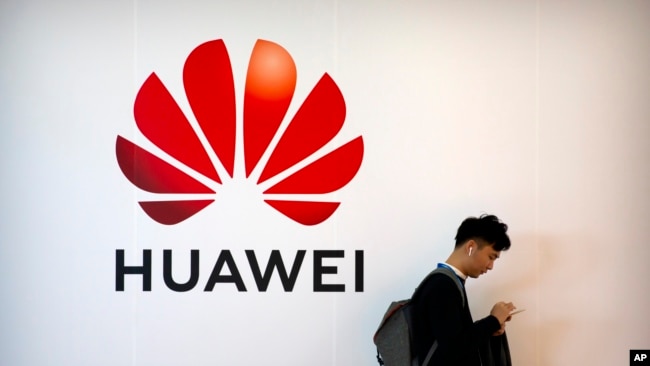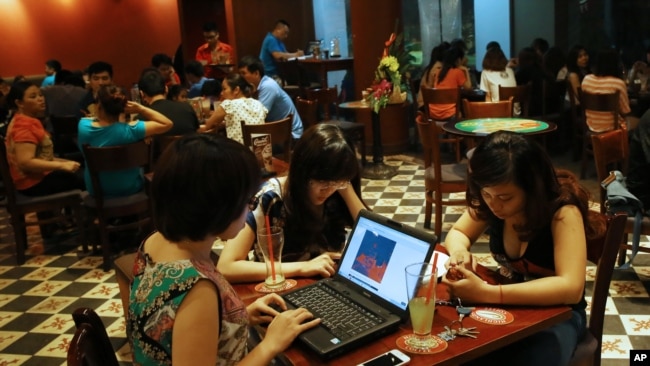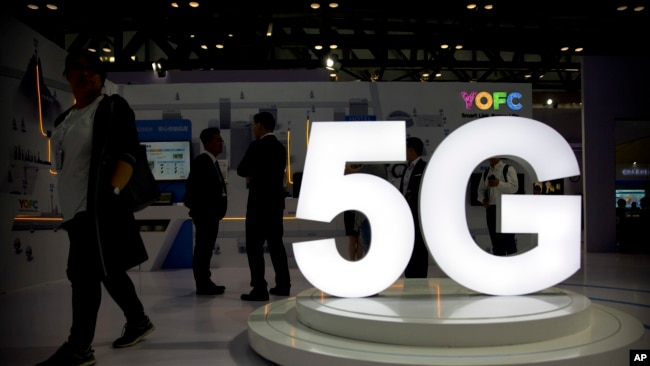A Vietnamese company says it has been developing its own equipment to launch 5G mobile services nationwide. But some experts question whether the country has the ability to develop what it is claiming.
The company, Viettel Group, announced earlier this month it is aiming to launch 5G services beginning in June. 5G is the next generation in wireless technology.
The announcement came after Viettel – which is run by Vietnam’s military – demonstrated a test video call carried over its 5G network. Top officials from the government and Viettel attended the demonstration event in Hanoi.
The officials said the equipment and software used to make the 5G call was developed by Viettel over a six-month period. The company says it plans to develop both civilian and military services based on its own 5G equipment and network.
Viettel declared that with its technology development, it had become the sixth company in the world to produce 5G network equipment. The other companies working on the technology include Huawei, Nokia, Ericsson, Samsung and ZTE.
China-based Huawei is the world’s largest telecommunications equipment supplier, capturing nearly 30 percent of the market. The company is a leader in 5G mobile networks and a top producer of smartphones. Huawei is currently working on building 5G systems in countries around the world.

In this Oct. 31, 2019, filer photo, a man uses his smartphone as he stands near a billboard for Chinese technology firm Huawei at the PT Expo in Beijing. (AP Photo/Mark Schiefelbein, File)
But in the United States, officials have urged American companies not to use Chinese technology, including Huawei equipment, in communications systems. The officials have expressed concerns about Huawei’s links to the Chinese government, saying the company’s network equipment could be used to help carry out spying activities. Huawei has rejected such accusations.
The U.S. administration also placed a ban on American companies sharing technology with Huawei because of security concerns. It has also pressed other countries to ban Huawei from building 5G networks.
Viettel’s Chief Executive Officer, Le Dang Dung, told Bloomberg last August that the company had no plans to work with Huawei. “There were reports that it’s not safe to use Huawei,” Dung said at the time. “So Viettel’s stance is that, given all this information, we should just go with the safer ones. So we choose Nokia and Ericsson from Europe.”
Viettel did not name Nokia and Ericsson as partners during its demonstration of the new 5G equipment.
Experts question claims of 5G
Dimitris Mavrakis is the research director for ABI Research and an expert on the worldwide telecommunications industry. He told VOA he is doubtful about Vietnam’s new claims.
"I would say that a home-developed 5G infrastructure is impossible. Not only improbable, but impossible. Because it is very difficult," Mavrakis said. If such a process was so easy, he noted, major American companies “like AT&T and Verizon would have done it as well."

Three young Vietnamese girls use a laptop and smart phones to go online at a cafe in Ha Noi, Viet Nam Wednesday, May 14, 2013. (AP Photo/Na Son Nguyen).
Mavrakis said among the biggest problems Vietnam would face creating such a system would be huge research and development efforts and costly patents covering 5G technology. He added that Viettel most likely does not have any patents for intellectual property rights relating to the technology.
“And in fact, Viettel doesn't have a big enough research and development workforce in order to create this technology,” Mavrakis said. "Even Huawei and Ericsson and Nokia had to spend billions to create this technology,” he added.
Murray Hiebert is a senior associate with the Center for Strategic and International Studies in Washington, D.C. He told VOA he is not surprised that Vietnam would be unwilling to cooperate with Huawei on its 5G development. This is because Vietnam has long felt pressure from China in a number of areas, particularly over issues involving the disputed South China Sea.
Therefore, Vietnam is “very, very sensitive to letting Chinese technology be used for developing 5G in Vietnam, particularly Huawei,” Hiebert said. However, he said he is not sure what to think about Vietnam’s announced plans for homegrown 5G.
“I guess I'm a little surprised that they're declaring they have reached this goal when others are still striving for that goal who have been working at it a lot longer and have more experience.”

Visitors stand near a 5G logo at a display for Chinese fiber optic cable maker YOFC at the PT Expo in Beijing, Wednesday, Sept. 26, 2018. (AP Photo/Mark Schiefelbein)
Hiebert noted that Viettel has already expanded its telecommunications services to other Asian neighbors and beyond, and may want try to do this with 5G technology as well. “But whether that is realistic or not, I don’t know,” he noted.
Hiebert said one reason he thinks Vietnam might have made the 5G announcement is to keep on a path of attempting to grow its international influence.
The country takes over this year as chair of the Association of Southeast Asian Nations, or ASEAN. Vietnam is also serving until 2021 on the United Nations Security Council. In addition, Vietnam is preparing for its next Communist Party National Congress in January 2021.
Hiebert said Vietnam’s announced 5G plans could be used in 2020 to help fuel political support both at home and abroad.
“So it's a big political year and some leaders may want to show that they are actually very capable of delivering on the economic and security front.”
I’m Bryan Lynn.
Bryan Lynn reported this story for VOA Learning English. Hai Do was the editor.
Words in This Story
network – n. a system permitting people to communicate and share information through the internet using a computer or mobile phone
stance – n. an opinion or belief about something
doubtful – adj. unsure
infrastructure – n. the basic equipment and structures (such as roads and bridges) needed for an area to operate
patent – n. a legal right a person or company receives to make or sell a product
intellectual property – n. property such as inventions, research and media that carry rights for the owner to use, sell or gain from the property
strive – v. try very hard to do something
capable – adj. able to do something
deliver – v. to achieve something that was promised to do